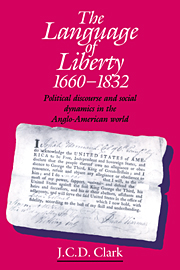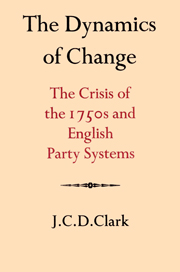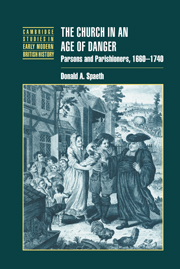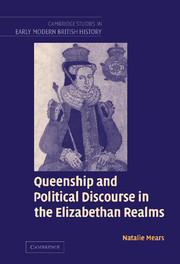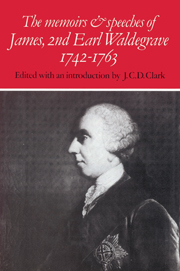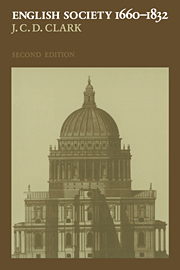The Language of Liberty 1660–1832
This book creates a new framework for the political and intellectual relations between Britain and America in a momentous period that witnessed the formation of modern states on both sides of the Atlantic and the extinction of an Anglican, aristocratic and monarchical order. It stands as part of a project aimed at revising the map of early modern English-speaking societies, which includes Dr. Clark's previous books English Society, 1688SH1832 (1985) and Revolution and Rebellion (1986). This important revisionary study will be essential reading for historians, social scientists and students of literature of the period.
- A major new study by one of the most prolific, gifted and controversial historians of the day
- Breaks the mould of all existing accounts of the intellectual origins of the War of Independence in America
- Analyses in depth two centuries of political, intellectual and religious discourse in England and America
Reviews & endorsements
"Jonathan Clark's erudite, powerfully-argued Language of Liberty synthesizes a vast array of recent scholarship as well as contemporary literature." Albion
"This volume displays the same mixture of intelligence, imagination, rigor, and bombast as Clark's other books....provocative." The Journal of American History
"J.C.D. Clark's study is broader in scope, dealing with both Britain and America and also plumbing the legal dimension along with the religious. It is extremely learned...Too, the work is provocative...the work is persuasive...there is much of value in Clark's book." National Review
"By adding religion to the interpretive mix, Clark has enriched our understanding of the origins of American popular culture." Times Higher Education Supplement
"Arguing against prevailing opinion that secular notions of republicanism and Lockean rights inspired the American Revolution, Clark contends that the larger transatlantic debates of the long eighteenth century found their core in law and religion....The Revolution, he concludes, must be understood as a religious and civil war among transatalantic British societies." Philip Goff, Religious Studies Review
Product details
October 1993Paperback
9780521449571
424 pages
229 × 152 × 24 mm
0.62kg
Available
Table of Contents
- Introduction: the structure of Anglo-American political discouse
- 1. Law, Religion and Sovereignty
- 2. Constitutional Innovations and their English Antecedents
- 3. The genesis of political discourse
- 4. Transatlantic ties and their failure
- 5. The Commonwealth paradigm
- 6. Denominational discourse
- 7. The implications of theological conflict
- 8. Denominational dynamics and political rebellions
- Part I. The Conflict Between Laws: Sovereignty and State Formation in the Uniter Kingdom and United States:
- 1. Law, nationality and nationalism: monarchical allegiance and identity
- 2. The creation of the United Kingdom, 1536–1801: religion and the origins of the common-law doctrine of sovereignty
- 3. Sovereignty and political theory from Justinian to the English jurists
- 4. Natural law versus common law: the polarisation of a common idiom
- 5. Sovereignty, dissent, and the American rejection of the British state
- 6. Sovereignty and the New Republic: the American constitution in transatlantic perspective
- Part II. The Conflict Between Denominations: The Religious Identity of Early Modern Societies:
- 1. Before redefinition: politics and religion in the old society
- 2. Anglicanism as an agency of state formation: the question of establishment
- 3. Canon law, heterodoxy and the American perception of tyranny
- 4. The Anglican ascendancy as the hegemony of discourse
- 5. The Anglican dream: harmony and conflict in the English parish
- 6. The Anglican nightmare: sectarian diversity in colonial America
- Part III. Predispositions: Rebellion and its Social Constituencies in the English Atlantic Empire, 1660–1800:
- 1. Rebellions and their analysis in the Anglo-American tradition
- 2. Covenanters, Presbyterians and Whigs: resistance to the Stuarts in England and Scotland, 1660–1689
- 3. Colonial American rebellions, 1660–1689, and transatlantic discourse
- 4. The rights of Englishmen, the rhetoric of slavery, and rebellions in Britain and America, 1689–1760
- 5. The right of resistance and its sectarian preconditions in north America, 1760–1799
- 6. The rhetoric of resistance and its social constituencies in England and Ireland, 1733–1828: some transatlantic analogies
- 7. Denominations, social constituencies and their activation
- Part IV. Political Mobilisation: The American Revolution as a War of Religion:
- 1. The American Revolution as a civil war
- 2. Predispositions, accelerators and catalysts: the role of theology
- 3. Heterodox and orthodox in the Church of England
- 4. The divisions and disruptions of English dissent
- 5. Heterodoxy and rebellion in colonial America, 1760–1776
- Conclusion: 'Desolating Devastation': The Origins of Anglo-American Divergence.

